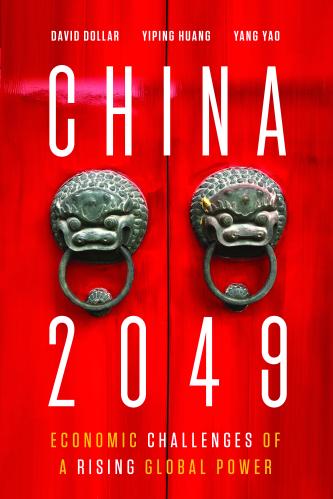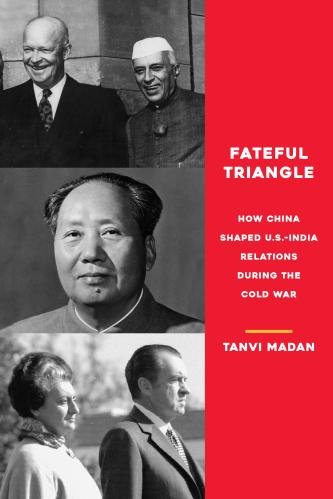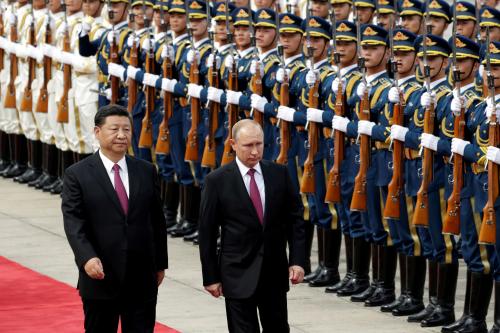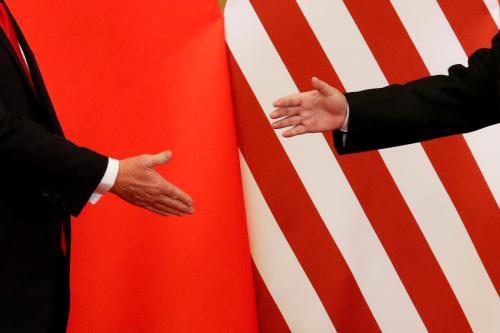With the November presidential election looming, many China watchers are focused on what the outcome could mean for relations between Washington and Beijing. That question is no doubt a crucial one. At the same time, many trends in that all-important relationship are of course longer-term than one presidential administration. What are the long-term prospects for U.S.-China relations at this stage?
The differences between the United States and China on political, economic, ideological, technological, and security issues are real. They can and must be managed through dialogue, but we can’t pretend that we simply have a communications problem. Both sides know better. The basic framework for the relationship going forward is likely to be strategic competition, with cooperation in discrete areas, hopefully covering many subjects. There could instead be strategic rivalry, which would be more adversarial and require cool heads to manage disputes. Or the relationship could degenerate into a cold war, which would be in the interest of neither the United States nor China.
A U.S.-China cold war would not be like the U.S.-Soviet one, which was largely military and ideological. A cold war would begin with radical decoupling and disengagement, which regrettably we are already seeing. It would descend and expand from there. It would fracture the international community on issues on which there should otherwise be widespread cooperation. It would build walls between economies, scientists, scholars, and ordinary people. It would likely foment ethnic stereotyping, discrimination, and hatred. It would prevent two great civilizations from benefiting from each other’s strengths and contributions. It would exacerbate an arms race that would crowd out domestic priorities. Above all, it would increase the risk of military conflict, even if neither side desires it.
How do we avoid such an outcome? There are fundamental questions the U.S. and China will need to answer.
For the United States: Is it willing to accept a peer competitor, particularly one with a different political system and ideology? In principle, the answer should be yes, but there is an action/reaction mechanism in U.S. politics. An administration that fully accepts China as a peer inevitably will have to endure and beat back harsh attacks from a nationalist opposition. So it will require long-term steadiness, not a one-off decision. The United States can sustain such a view if China accommodates to the traditional stabilizing role of the United States in East Asia rather than seeking to undermine it.
For China: Can it comfortably integrate and assimilate into a rules-based international order created and historically dominated by the United States, and characterized by certain norms, such as on trade, protection of intellectual property rights, privacy, digital freedoms, rule of law, due process, transparency, law of the sea, and human rights? (I would add that it is essential that the U.S. failure to show traditional respect for the rules-based international system over the last several years must be corrected, as well.)
Can China adjust to these norms, or will it simply demand that its national system be respected? Can China find ways to ensure that its activities in international affairs are consistent with these norms, or at least do not undercut them, while maintaining its own political, economic, and social system?
A lesson of the past few years is that, in a globalized world, it is difficult for the international system to function well if there is a large gap in attitudes and practices among major countries regarding these norms.
China made the fundamental decision 40 years ago to join the international system, from which it has derived great benefits and to which it has made important contributions. But the world’s accommodation of China’s unorthodox practices when it was a relatively minor player is a different matter entirely. Today, China has become a dominant actor. China, along with the United States, is now an elephant in the canoe. The elephants have to be careful, or they can swamp the canoe and everyone in it.
For understandable historical reasons, China is especially fierce in safeguarding its sovereignty and asserting the sovereignty of nations and non-interference as the foundational principles of international norms. No more than the United States can China be expected to renounce that position. But China will need to do more than invoke its sovereignty under Westphalian principles if it is to be a leader in the international system and enjoy its full benefits. The country has not yet completed the journey it began in 1978 toward full integration into the international rules-based system. For example, it needs to accept the full obligations of developed countries in the World Trade Organization, open its internet and level the information technology sector playing field for foreign participation on a reciprocal basis, and provide complete transparency to the World Health Organization and international health experts.
It will need to lead by example. It will be hard for China to make such changes. The United States can provide an example, and serve its own interests, by showing that it intends to adhere to the rules-based system that it played the key role in creating.
The John L. Thornton China Center organized a virtual dialogue on August 13 on the challenges in U.S.-China relations. The meeting was joined by senior Brookings executives, Thornton Center scholars, and members of the Brookings China Council. China’s Ambassador to the United States, Cui Tiankai, offered remarks and answered questions. As part of the meeting, Brookings Senior Fellow Jeffrey Bader provided commentary framing the principal challenges in the bilateral relationship. His remarks, transcribed above, are meant to start a conversation, not continue a shouting match.










Commentary
Avoiding a new Cold War between the US and China
August 17, 2020